
Alpha Mom Book Club: NurtureShock… A New Way to Think About Children, or Not?
 I remember the buzz that surrounded NurtureShock: New Thinking About Children when it was published a few years ago, so I was excited that this was the book chosen for this month’s book club selection. In the introduction the book promises to shock parents and to turn all of our long held assumptions about parenting on their head. I was ready, highlighter in hand to learn something new and revolutionary, have new tools to bring to my parenting game. That just didn’t happen.
I remember the buzz that surrounded NurtureShock: New Thinking About Children when it was published a few years ago, so I was excited that this was the book chosen for this month’s book club selection. In the introduction the book promises to shock parents and to turn all of our long held assumptions about parenting on their head. I was ready, highlighter in hand to learn something new and revolutionary, have new tools to bring to my parenting game. That just didn’t happen.
 As I read the book I kept waiting for the shocking part and it just never came. When I was about halfway through the book I kept wondering if I had already read it. I hadn’t.
As I read the book I kept waiting for the shocking part and it just never came. When I was about halfway through the book I kept wondering if I had already read it. I hadn’t.
Each chapter of the book is so different from each other that it was like reading 10 magazine articles. Some topics might interest you, some not at all. I’ll be honest learning to talk, or preschools, or baby-related things don’t interest me as mush as teenagers and the way their brains work.
Putting that aside, did I think it was a good book that was worth reading as a parent? Yes.
The book is broken into ten chapters that address wildly different parenting topics and so I thought this time I would go through each chapter separately. As I read the book I was thinking that there would probably be people who would pick and choose which chapters they read based on how relevant the information was to their lives.
Chapter One: The Inverse Power of Praise
The gist of this chapter is that false praise is damaging and has the opposite effect on self-esteem. When you praise your child for things that are out of their control, “You are smart!” it makes them not want to try new and difficult things because they might fail and therefore not be smart. “When we praise children for their intelligence… we tell them that this is the name of the game: look smart, don’t risk making mistakes.”
What I found interesting and new in this chapter was the study that was done in which children watched other students receive praise from the teacher. “By the age of twelve, children believe that earning praise from a teacher is not a sign that you did well–it’s actually a sign you lack ability and the teacher thinks you need extra encouragement.” They believed that a teacher who was critical conveyed the message that the student can improve even more.
Chapter Two: The Lost Hour
This chapter talked about our kids, especially teens, getting less and less sleep and the impact that it has on them. There was nothing really new for me in this chapter, though the statistics themselves are certainly shocking– “a loss of an hour of sleep is equivalent to [the loss of] two years of cognitive maturation and development.” How many of us have had a child acting up and knew it was because they were overtired. There is science to back that up now.
I am exceedingly thankful that I live in a school district where the highschool starts later in the morning. The start times for the schools are staggered, elementary starting first, then middle school, and finally highschool almost two hours later.
Chapter Three: Why White Parents Don’t Talk About Race
Why don’t we? I don’t honestly know. It never occurs to us? It seems like it would be racist to talk about race? We don’t know what to say? Can’t we just raise our kids to be colorblind by ignoring race all together as if it doesn’t matter? These are the questions that I asked myself before I began reading the chapter. I honestly do not know if I have discussed race in any meaningful sort of way with my children.
So it was with those questions in mind that I went into the chapter and I came across this about not mentioning race or ethnicity, “Saying something about it unavoidably teaches a child a racial construct. They worry that even a positive statement… will still encourage the child to see divisions within the society.” But studies have shown that children do see race and without guidance they will form their own conclusions. I personally found the statistic that only 8% of white children will have a best friend of a different ethnicity to be staggering.
Chapter Four: Why Kids Lie
They lie because they don’t want to disappoint their parents and they are afraid of getting into trouble. The child thinks if I am going to get into trouble for this thing I did wrong, why not lie and maybe I will be lucky and my parents will believe me! I have seen this play out time and time again in my own house with my children. The youngest children I have always attributed the lying to more of a wishful thinking– if I don’t say that this thing happened then it is like it never really happened. It is the lying of the older kids that baffles me the most, especially the lying that happens when they are confronted with the truth and continue to hold on to the lie. “Increasing the threat of punishment for lying only makes children hyper-aware of the potential personal cost. It distracts the child from learning how his lies impact others.”
So how do you stop your kids from lying? Well the authors say that the only way is to tell your children that it will make you happy if they tell you the truth, to teach them the value of honesty. To be honest, this seems a bit simplistic, but then again I haven’t had any chronic issues with lying.
The second half of this chapter resonated with me. Tattling. It drives me absolutely bonkers when kids come to parents, teachers, or authority figures and their complaints are dismissed. We wonder why our older kids and teenagers don’t open up to us, don’t tell us their problems… for years we told them to work it out on their own. What we viewed as petty playground problems were huge problems in their little world, why should we expect that as they grow older and have bigger problems that they will be able to tell the difference and know when to come to us.
Chapter Five: The Search for Intelligent Life in Kindergarten
Having experience with the talented and gifted programs, I nodded my head all the way through this chapter. I have friends who want nothing more than to get their kids into the TAG programs here, but my experience has been that they are just more of the same, there isn’t anything revolutionary about the way they are being taught and by middle school the distinctions are all but gone. I have a son who taught himself to read at age 3. By kindergarten he was reading long novels. I have another son who didn’t read proficiently until he was 9. They are now 17 and 18 and you couldn’t tell which son was which. The one who started reading at 3 is no more gifted than his brother. “We need to question why this idea of picking the smart children early even appeals to us.” To that I say, amen.
Chapter Six: The Sibling Effect
I am an only child and I have seven children of my own. Observing their relationships with each other has brought me so much joy, but also caused so much anxiety. I don’t really understand sibling relationships. I grew up alone thinking that if I had siblings I would have best friends with me all the time, and that is not the case. For the most part my children get along well with each other. Some are better friends than others and their relationships have pretty much remained the same over the course of their young lives. I look at my oldest children, who are pretty much adults now, and their relationship is the same as it was when they were 2 and 3 years old. The same dynamic still exists.
Chapter Seven: The Science of Teen Rebellion
This chapter revisited the topic of lying, this time from the teen perspective. Yup, older kids are still lying for the exact same reason they did when they were younger. “To an adolescent, arguing is the opposite of lying.” In a nutshell it means that kids were willing to not lie to their parents if they thought they could change their parents’ mind about something.
The authors offer up evidence that arguing with teenagers isn’t destructive, that teenagers view arguing as a way to feel closer and more connected to their parents. What I took away from this was that it is better for your kids to argue and complain to to you than it is for them to say nothing and quietly go on their way disobeying and lying without you ever knowing. This is why expecting blind obedience from your children doesn’t work.
This chapter also dealt with the neuroscience behind risky teen behavior. Anyone who has ever said to their teenager, “Just what were you thinking?” knows what I am talking about. Their brains do not yet work like adult brains. They are far more motivated by immediate rewards and gratification than they are deterred by potential risks.
Chapter Eight: Can Self Control Be Taught?
When I read the title to this chapter I thought, I sure hope so otherwise we are all screwed!
This chapter ties in with the previous chapter about teenagers and risky behavior. The authors start with statistics on driving and the efficacy of driver’s education. You know what reduces teen driving accidents? Not driving with their friends in the car.
The authors take a weird leap in this chapter to discussing the Tools of the Mind early elementary school curriculum, something which sounds very Montessori-like to me. My kids are all well beyond the age of the Tools program, and I found myself reading and thinking, darn, it’s too late for us! I’m not sure how you find classrooms that are run this way within the public schools, but if I had young children I would be doing some research.
Chapter Nine: Plays Well With Others
For parents who have long believed, despite any empirical evidence, that watching Disney channel and Nickelodeon made their kids bratty, this chapter is for you! This chapter examined why our children aren’t kinder and gentler than they were a generation ago. The tamer television shows resulted in kids “learning the advanced skills of clique formation, friendship withdrawal, and the art of the insult.” They don’t even mention how in all these shows geared for kids there is no parenting. When parents do show up they are ridiculed and portrayed as dumb.
Chapter Ten: Why Hannah Talks and Alyssa Doesn’t
Okay, I’ll admit it. I didn’t care about this chapter at all. Partly, I assume, because my children are so far past the age of learning to talk. And the other part because it all seemed like such common sense. Respond to your baby when they are making sounds to you, don’t park them in front of the tv. This chapter, unlike any of the others, seemed to be built on guilt. You must do these things if you want your baby to talk and have a large vocabulary. But they don’t offer any compelling evidence that being a later talker puts a child at a disadvantage long term. Maybe others of you who have children in this age group can chime in and tell me if it resonated with you or if you learned anything.
In conclusion, this was a meaty book. I probably would not have read it all the way through at once if I were not writing about it. I like that the chapters stand alone.
So now tell me what you thought of NurtureShock? Was there anything new or shocking to you that made you turn your assumptions of parenting on its head?
Here are the discussions for our other picks: Far From The Tree, How To Talk So Kids Will Listen, and Five Love Languages of Children.

